Product Discovery with ChatGPT
Fede shares with us 7 things he thinks ChatGPT could help during the Product Discovery process.
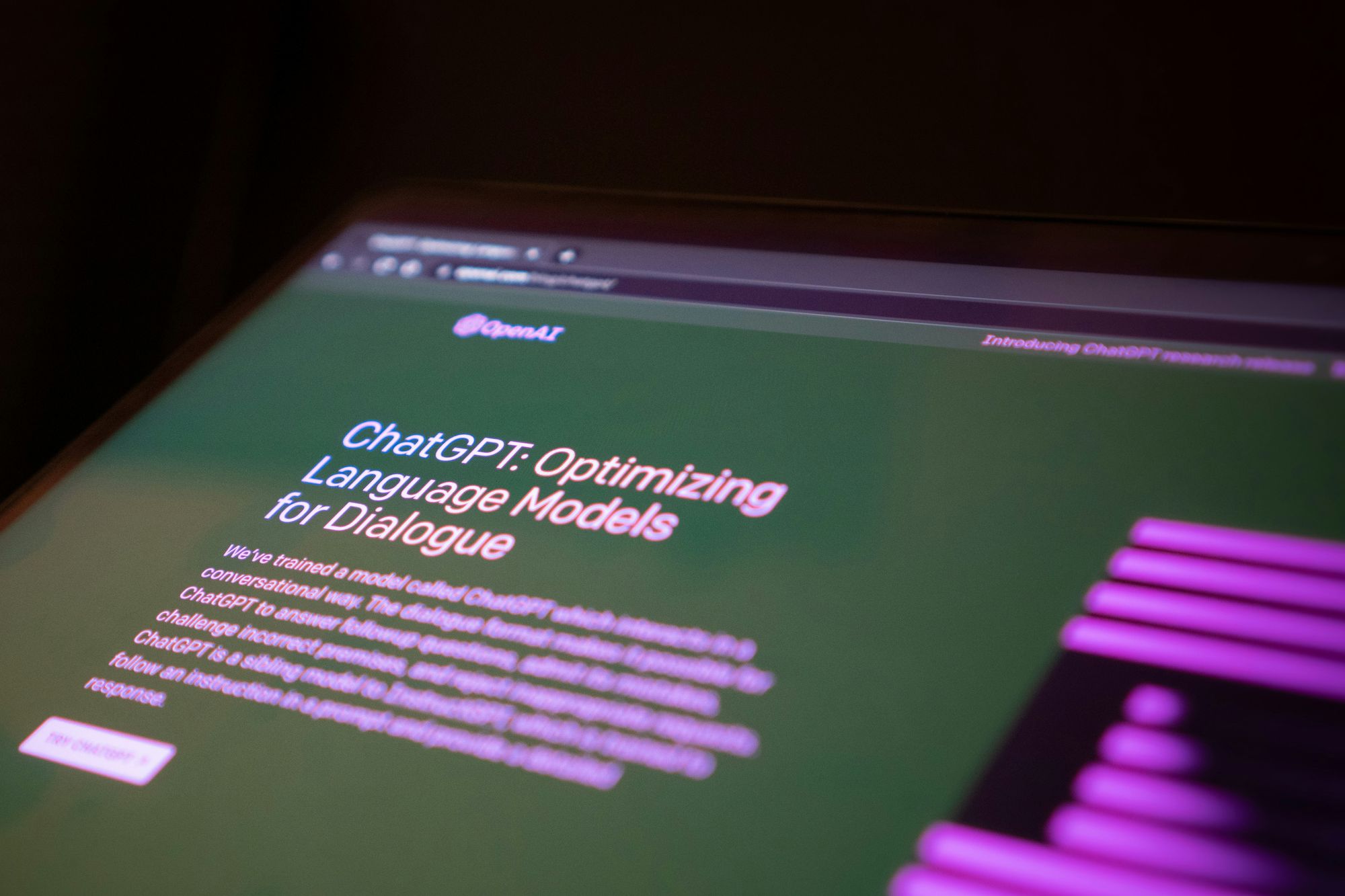
Like many other people, I am excited about ChatGPT. As a software developer, I am keen to understand how it can help software product teams. In this post, I’ll describe 7 things I think it could help with during the Product Discovery process.
Before diving in, there are a few disclaimers that need to be made: this content is based on a quick research written with examples of a real estate product (I haven’t been able to try these things with a product team, but I’m looking forward to doing so.).
Throughout this post, I will be sharing the different prompts that I used, but it is important to understand that ChatGPT can give different answers each time you ask (this may be an advantage when you are researching and discovering, as it may allow you to brainstorm more ideas)
1. To Brainstorm: ChatGPT is great for brainstorming. You can prompt it to write for you elevator pitches, lean canvas, value proposition, or any other tool you use for product discovery. For example, you can prompt it to write an elevator pitch:
Create an elevator pitch with the following characteristics
Describe 3 problems
Describe 3 solutions
and describe the advantages of these solutions overexisting solutions
And ChatGPT would answer you:
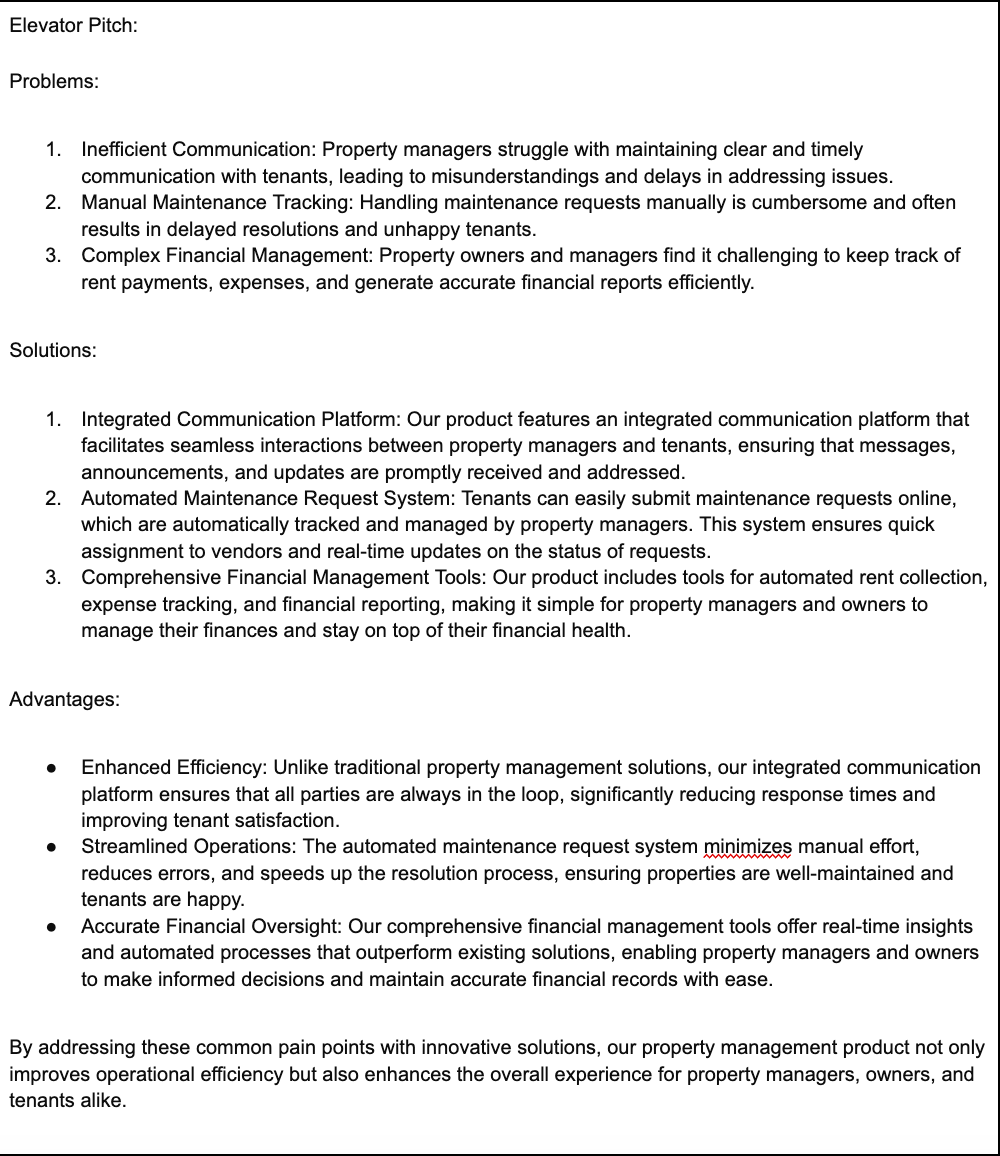
You can prompt ChatGPT to focus only on sales (prompt: I would like the product to focus only on sales), or give you other solutions (prompt: Can you list 3 other problems and 3 other solutions?), give you direct competitors (prompt: Regarding the last elevator pitch, can you list 3 direct competitors?) and even create an empathy map for one of the users (prompt: Can you give me an empathy map for the real estate agent?). The better you know the (discovery) tools, the better you will be able to prompt ChatGPT to give you useful information. Something to keep in mind is this doesn’t replace the final users. It should be used to brainstorm and to get new ideas, but never to replace interviews.
Take a look at the ChatGPT thread here: https://chatgpt.com/share/50dec419-c5da-4bd7-bd99-b2f9252237cd
2. To learn new (discovery) tools: ChatGPT is great to learn about the tools you can use in product discovery. For example, you can prompt it to give you tools to write the value proposition:
You are a Product Manager in a Product Software Company
Give me 3 tools that allow me to write the value proposition
And ChatGPT would answer you (copying the 1st one):
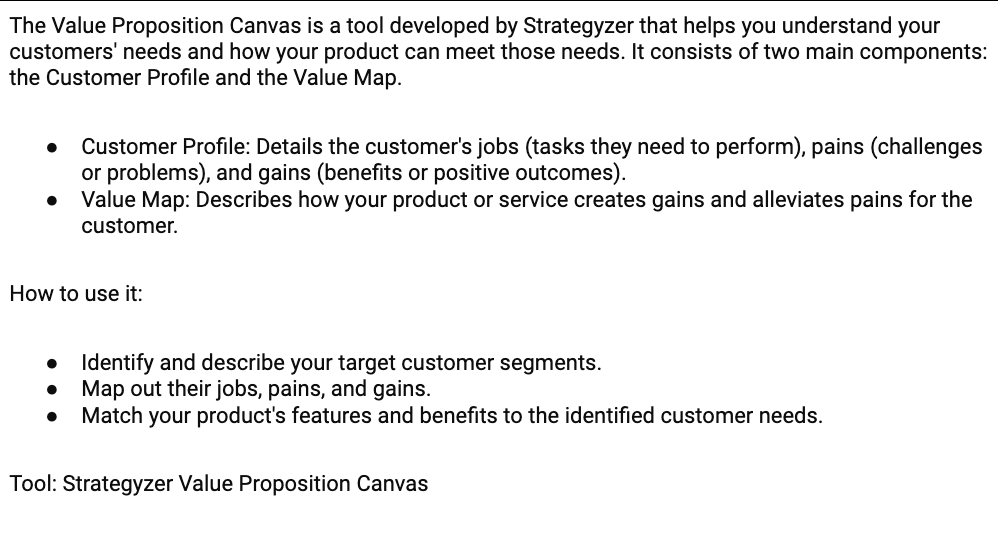
These are some other prompts:
- Can you give an example of a customer journey of a real estate agent in a real estate product?
- Can you give me tools to understand the risks and assumptions?
- Can you give me tools to design user flows for different use cases?
- Can you explain how to facilitate a user story map session?
Take a look at the ChatGPT thread here: https://chatgpt.com/share/7f99dbad-f362-443b-a478-4eeb36bb871f
3. To summarise (large) documents: one of the things product managers need to do is to read newsletters, reports, etc. ChatGPT is great at summarising information. You can use a GPT called ‘PDF Summary’ to upload your pdf and ask questions. For example, I uploaded a report with the rental market opportunities in Miami and asked it questions like:
Can you give me a summary of the rental market?
Would you recommend buying a house to rent with these conditions?
Take a look at the ChatGPT thread here: https://chatgpt.com/share/71b15faa-e6a5-4e35-ba53-5e6025a3305c
4. To do product research: as ChatGPT says, the product manager's job is to drive the product vision, strategy, and roadmap to ensure it meets market demands and provides value to our customers (see link below). I think ChatGPT could help product managers research and learn about the market. I believe the most important advantage over Google is the context you can give and maintain to resemble a conversation with a human.
Take a look at the ChatGPT thread here: https://chatgpt.com/share/f48f8412-7081-46bf-a144-15dd9086992d
5. To extract opportunities: I used the definition given by Teresa Torres: “An opportunity is a problem, need, or unfulfilled desire”. And ChatGPT is great at identifying opportunities in a user review text.
Please extract problems, needs or unfulfilled desires from this user review: "Many possibilities but very complicated to use "
Pros: It is probably the most complete software in terms of possibilities, workflows, roles, etc.
Cons: It’s not user-friendly at all. Quite complicated to use and requires a long training time.
And ChatGPT answers:
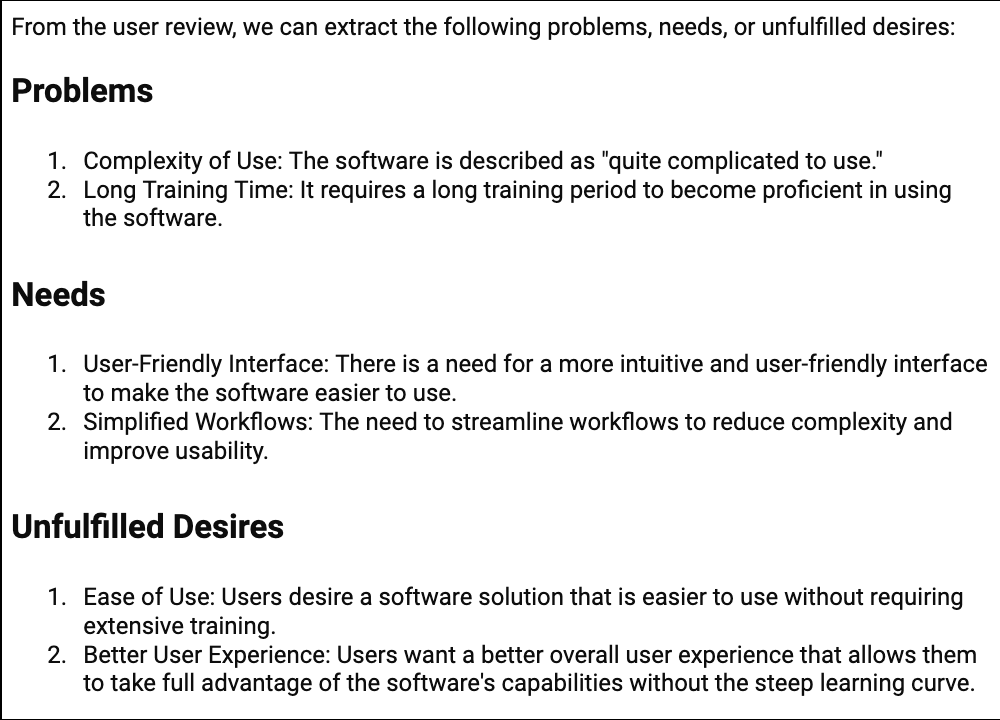
Then I can ask to categorize this problem based on the objectives of the company (thinking about OKRs here):
Given that I have 2 objectives for this semester: 1) Improve usability 2) Improve the ratio free/premium subscribers, can you tell me to which objective this problem corresponds: The software is described as "quite complicated to use."
And ChatGPT correctly answers:

I can imagine an Opportunity Solution Tree being built semi-automatically based on the opportunities detected by ChatGPT.
6. To understand how your users feel about the product: you can prompt ChatGPT to tell you the positivity level of a text, which could be anything the user expresses like a user review, an email and a comment to a production support person. With this information, you can build live charts that allow you to monitor the product. An example of this is this genre violence monitor built by Ezequiel Alvarez and his team that monitors the Twitter replies to women deputies in Argentina. Alarms can be set to detect significant changes (this may not be trivial as they need to be set using statistical error bars to prevent false alarms). I could imagine something similar being used to monitor the level of satisfaction of a product or detect certain anomalies or discomfort on a product based on what the users are saying.
I made a quick experiment with Amazon reviews to test this. First I asked ChatGPT to point me from 1 to 5 the positivity of this text where the human pointed 1. Then I asked it to point to a text review where the user assigned 3. In both cases, ChatGPT gave the same number of stars with a good explanation for each.
Take a look at the ChatGPT thread here: https://chatgpt.com/share/0748fc10-3b13-4ea0-a5c5-4c1011e4f941
7. To analyze the data: following the last use case, we can use ChatGPT to draw diagrams on the data and analyze it. I didn’t have the data, so I randomly created it, asked to draw a column chart, and provided an analysis.
I want to simulate a survey where people give punctuation from 1 to 5 to a product. Give me a random distribution for 200 surveys
And ChatGPT answers:
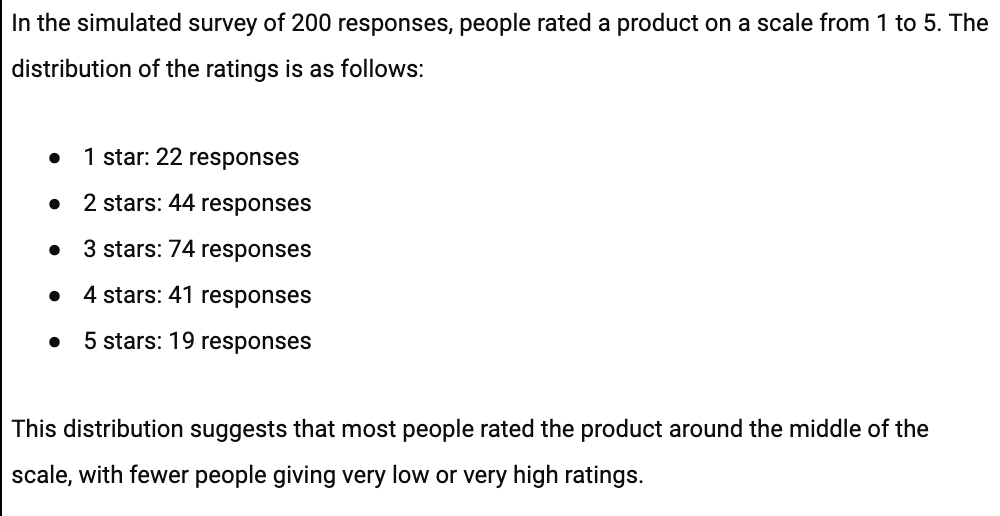
And then prompt:
Create a column chart with this data. In the x-axis, we have the values that different users have used to review our tool from 1 to 5. In the Y axis, we have the number of people that have given each number. Can you provide an analysis of the data?
And received:
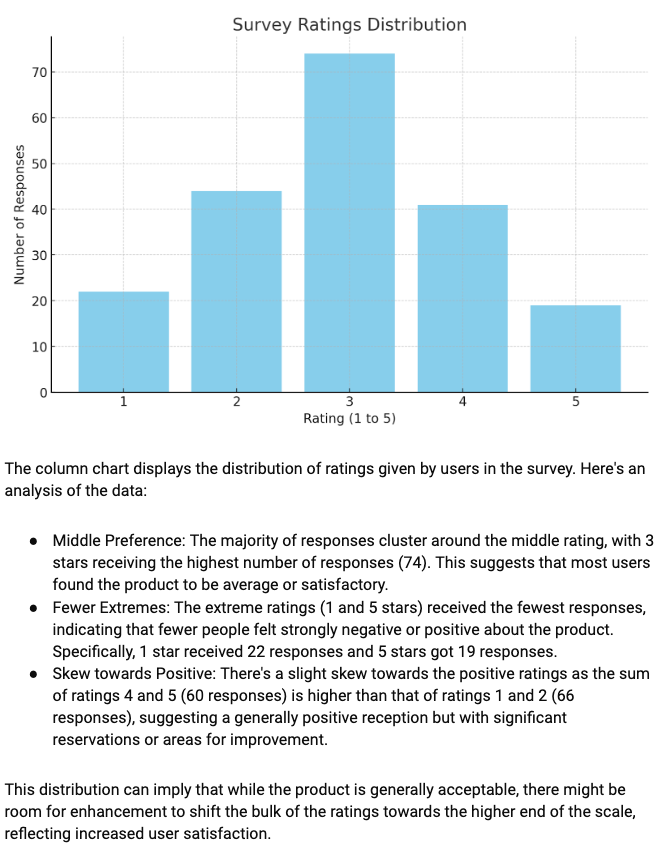
With this, you can automate the whole process. You can give punctuation to a text and create a live chart or report based on this information. I imagine this can be pretty useful for product managers trying to sense how users feel based on a great amount of information (calls, emails, tuits, etc)
8. To create quick prototypes: there are many tools to create wireframes and even html + css. There are GPTs to deploy automatically this code and no-code tools that grab figma designs and create the page. Let me show you a bit:
You can create wireframes:
Context: we are designing a web for real state agents
Create a wireframe for a form to add a new property with the following fields: address street, description, photos, nbr_rooms
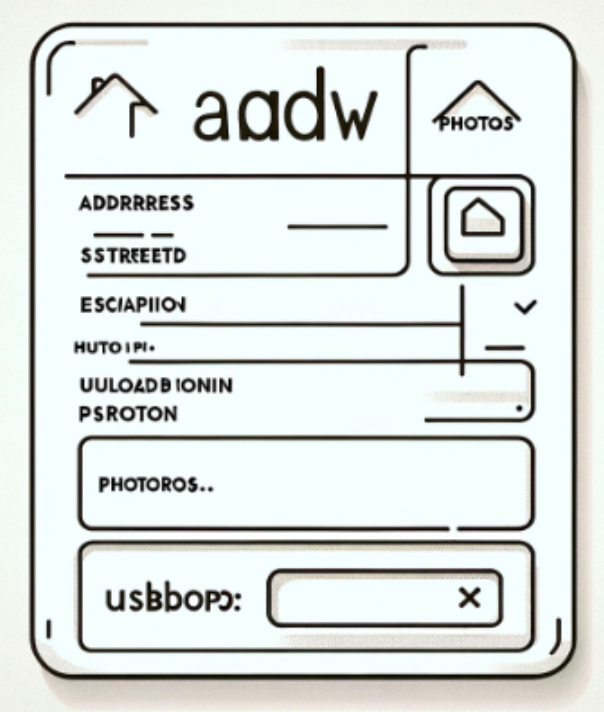
Another one, using a GPT called UX/UI Webpage Generator:
Context: we are designing a web for real state agents
Create a wireframe for a form to add a new property with the following fields: address street, description, photos, nbr_rooms
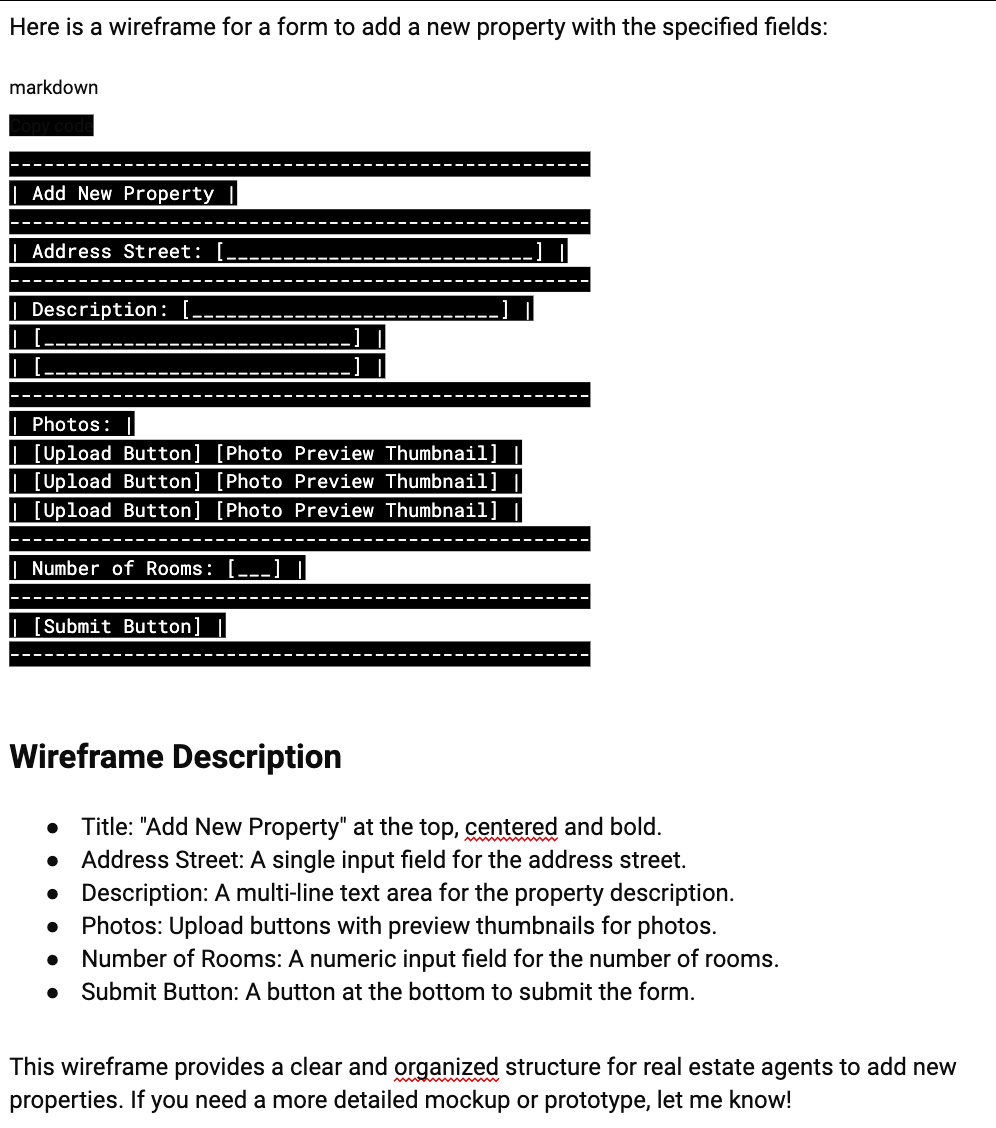
After that, you can create and download the html:
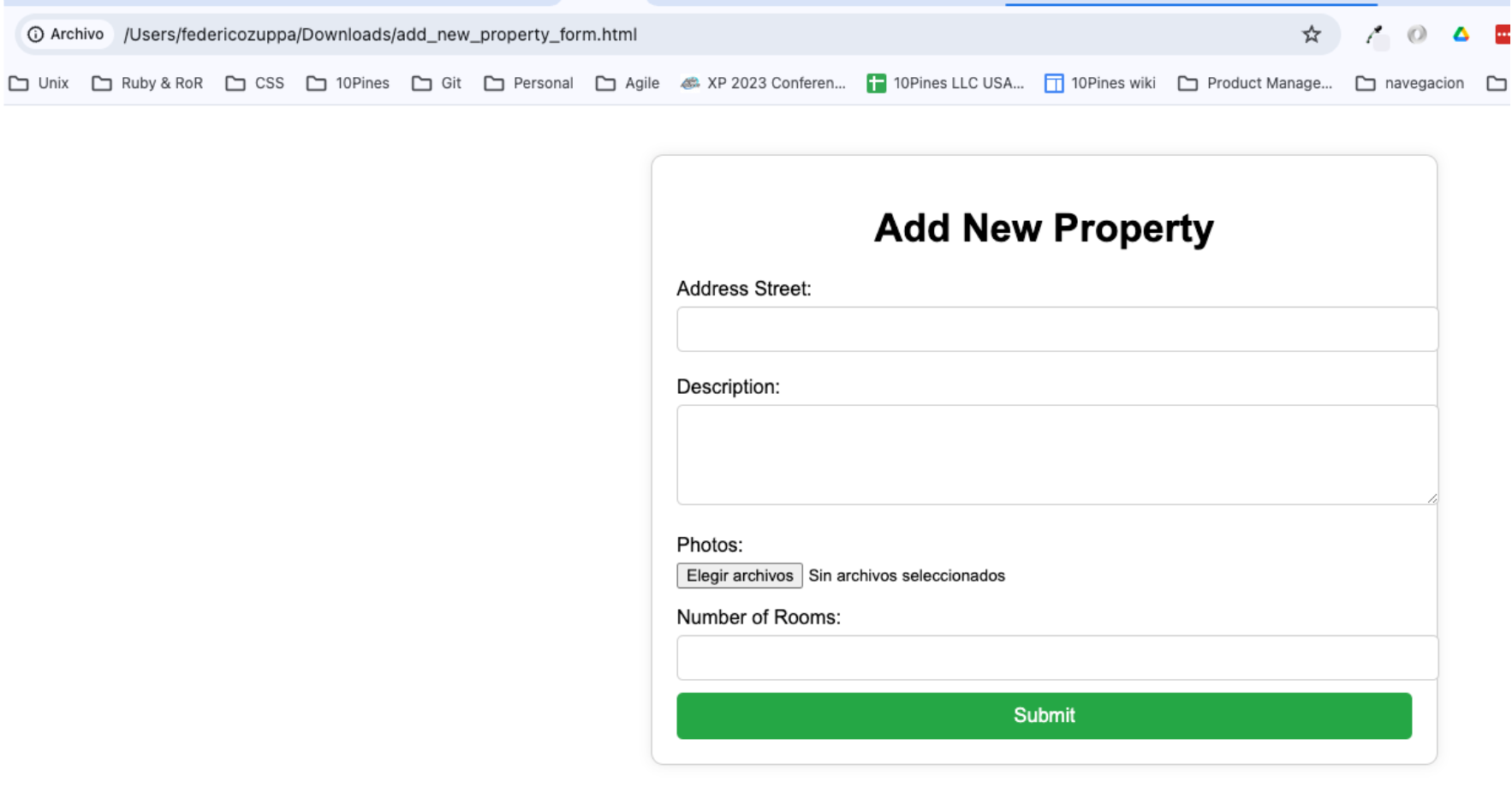
Conclusion
My conclusion from this quick research is that people should start using ChatGPT in their work. It is a great, cheap, and really fast, new member of the team with lots of great ideas. Of course, the more you know about Product Discovery and Product Management, the more profit you will be able to make as you can give better context and prompts.
Something really important to keep in mind is that, as ChatGPT states as a disclaimer, sometimes the answers are incorrect or biased. An expert will be able to discern/discard this information, others will use it as it is (I suppose the same will happen in all areas and domains).
